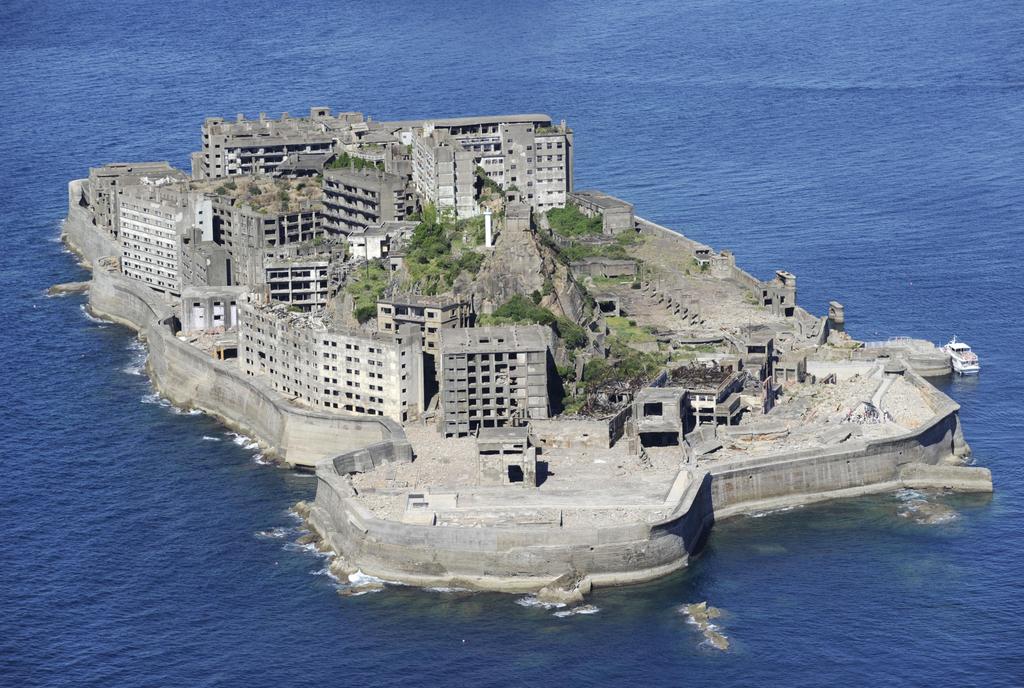- California Assembly OKs highest minimum wage in nation
- S. Korea unveils first graphic cigarette warnings
- US joins with South Korea, Japan in bid to deter North Korea
- LPGA golfer Chun In-gee finally back in action
- S. Korea won’t be top seed in final World Cup qualification round
- US men’s soccer misses 2nd straight Olympics
- US back on track in qualifying with 4-0 win over Guatemala
- High-intensity workout injuries spawn cottage industry
- CDC expands range of Zika mosquitoes into parts of Northeast
- Who knew? ‘The Walking Dead’ is helping families connect
Japan admits wartime forced labor in new heritage sites

This undated file photo shows Hashima Island off Nagasaki, southwestern Japan. It is one of the seven early industrial facilities out of its 23 for which Japan won world heritage status at a meeting of the UNESCO World Heritage Committee in the German city of Bonn. (Yonhap)
BONN/SEOUL, July 5 (Yonhap) — Japan won world heritage status Sunday for its old industrial sites, some linked with its wartime labor atrocities, after a deal with South Korea to publicly acknowledge a related history.
“There was a large number of Koreans and others who were brought against their will and forced to work under harsh conditions in the 1940s at some of the sites,” Japan’s ambassador to UNESCO Kuni Sato said at the annual meeting of the World Heritage Committee under way in the German city of Bonn.
The Japanese government “also implemented its policy of requisition” during World War II, she added.
The statement came as the 21-member UNESCO panel decided to add a package of Japan’s 23 early industrial facilities, including shipyards and coal mines, to the much-coveted list of world heritage sites.
More than 57,000 Koreans were forcibly conscripted to toil at seven of the sites. Around 90 of them died while working there, according to official data. Korea was under Japan’s brutal colonial rule from 1910-45.
Japan agreed to establish an “information center” to remember the victims and let visitors to the locales understand the history.
It was among “appropriate measures” Japan promised to take. Tokyo is required to submit a progress report on its relevant steps to the World Heritage authorities by the end of 2017 for a formal review at an annual meeting of member states the following year.
Japan’s statement was included in the formal UNESCO document on its decision.
The World Heritage Committee said in a footnote that it “takes note of” that.
South Korea welcomed the move.
“Today’s decision marks another important step toward remembering the pain and suffering of the victims, healing the painful wounds of history and reaffirming that the historical truth of the unfortunate past should also be reflected in an objective manner,” Vice Foreign Minister Cho Tae-yul, Seoul’s chief delegate to the meeting, said in response.
It was very unusual for the Japanese government to admit its wartime abuse of Koreans on the global stage, officials in Seoul noted.
South Korea and Japan have had months of talks over the issue.
Seoul initially opposed Tokyo’s UNESCO campaign itself but later shifted its strategy to use it as a chance for publicizing the neighbor’s wartime brutality.
The World Heritage Committee appreciated Seoul and Tokyo for their diplomatic agreement.
Maria Bohmer, who chairs the committee, called it an “outstanding victory” for diplomacy.
“This is the spirit of the World Heritage Convention that brings us always back together even in difficult times,” she said.












![일본 사도광산 [서경덕 교수 제공. 재판매 및 DB 금지]](http://www.koreatimesus.com/wp-content/uploads/2024/07/PYH2024072610800050400_P4-copy-120x134.jpg)



kelly
November 24, 2017 at 10:10 AM
Very nice and always successful.
This is a very good article.
I’m waiting for you the other article.
togel singapura